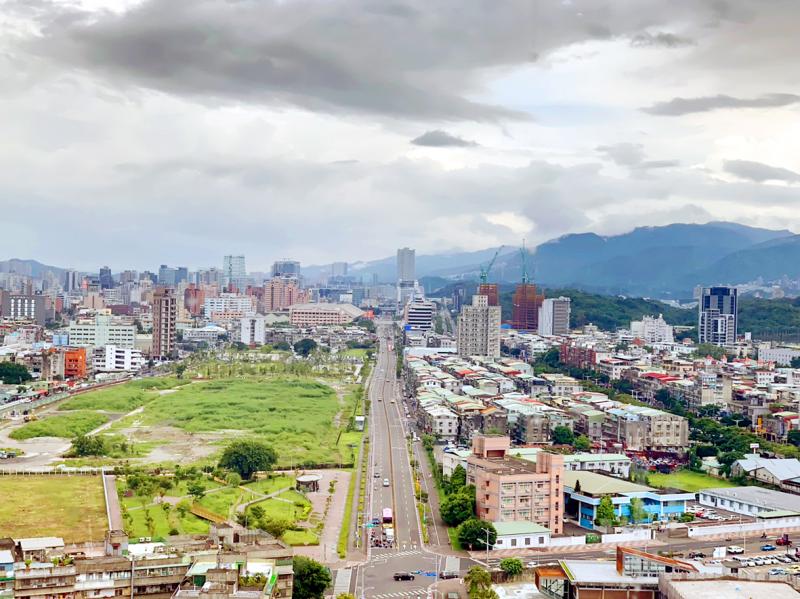Demand for plant construction is likely to be sustained for years, and is expected to benefit building material and construction companies, as well as some financial firms, Yuanta Securities Investment Consulting Co (元大投顧) said.
There has been stable growth in construction loans, as purchases of land and commercial buildings have been robust since last year.
Based on data released by the central bank on Oct. 26, construction loans grew for an 18th straight month in September to a record NT$2.323 trillion (US$80.4 billion), and rose 16.09 percent from NT$2.001 trillion a year earlier.

Photo: CNA
PROOF OF DEMAND
The annual growth in construction loans in September was higher than the annual increase of 7.65 percent in housing loans for the same month and an indication of solid demand for plant construction, Yuanta analyst Lisa Chen (陳玫芬) said in a note on Thursday.
“The phase one and phase two construction projects in the Southern Taiwan Science Park (南部科學園區) have taken up 95 percent of the park’s land, with Taiwan Semiconductor Manufacturing Co (TSMC, 台積電) accounting for more than 50 percent of that and more new construction projects planned in the next five years,” Chen said.
To rapidly expand its capacity, TSMC this year has spent nearly NT$10.01 billion purchasing manufacturing facilities in Tainan from E-Ton Solar Co (益通光能), Optimax Technology Corp (力特光電), Gudeng Precision Industrial Co (家登) and HannStar Corp (瀚宇彩晶), the company has said in regulatory filings.
DUTCH INTEREST
As semiconductor plants in the science park have reached a significant scale, Dutch semiconductor equipment maker ASML Holding NV has set up an office there with 2,800 employees, Chen said.
The park has obtained government approval to launch its phase three expansion project, in which it plans to acquire 92 hectares of land by 2023 to cope with the boom in plant construction and demand from returning Taiwanese businesses, she added.
BENEFICIARIES
“As these projects are for Taiwanese companies, they are driving demand for construction materials, as well as benefiting employment and housing demand in southern Taiwan. Relocation of plants back to Taiwan from China will continue to boost construction material demand even after 2021,” she said.
Construction material suppliers and construction companies, including Goldsun Building Materials Co (國產建材實業), Tung Ho Steel Enterprise Corp (東和鋼鐵), Universal Cement Corp (環球水泥) and Da Cin Construction Co (達欣工程), would likely benefit from the demand for plant construction, Yuanta said.
Goldsun leads Taiwan’s ready-mixed concrete market with a market share of 17 percent; Tung Ho is the nation’s leading rebar and section steel supplier; Universal Cement is a major ready-mixed concrete manufacturer in southern Taiwan and a national leader in gypsum board manufacturing; and Da Cin’s business mainly focuses on plant construction, with TSMC’s orders accounting for 40 percent of its revenue from this year to 2022, the investment consultancy said.
Meanwhile, rising housing and construction loans should be positive for financial firms such as Taiwan Cooperative Financial Holding Co (合庫金控) and First Financial Holding Co (第一金控), as these two state-run companies have more exposure to this area of business than their peers, Yuanta said.

Sweeping policy changes under US Secretary of Health and Human Services Robert F. Kennedy Jr are having a chilling effect on vaccine makers as anti-vaccine rhetoric has turned into concrete changes in inoculation schedules and recommendations, investors and executives said. The administration of US President Donald Trump has in the past year upended vaccine recommendations, with the country last month ending its longstanding guidance that all children receive inoculations against flu, hepatitis A and other diseases. The unprecedented changes have led to diminished vaccine usage, hurt the investment case for some biotechs, and created a drag that would likely dent revenues and

Global semiconductor stocks advanced yesterday, as comments by Nvidia Corp chief executive officer Jensen Huang (黃仁勳) at Davos, Switzerland, helped reinforce investor enthusiasm for artificial intelligence (AI). Samsung Electronics Co gained as much as 5 percent to an all-time high, helping drive South Korea’s benchmark KOSPI above 5,000 for the first time. That came after the Philadelphia Semiconductor Index rose more than 3 percent to a fresh record on Wednesday, with a boost from Nvidia. The gains came amid broad risk-on trade after US President Donald Trump withdrew his threat of tariffs on some European nations over backing for Greenland. Huang further

Macronix International Co (旺宏), the world’s biggest NOR flash memory supplier, yesterday said it would spend NT$22 billion (US$699.1 million) on capacity expansion this year to increase its production of mid-to-low-density memory chips as the world’s major memorychip suppliers are phasing out the market. The company said its planned capital expenditures are about 11 times higher than the NT$1.8 billion it spent on new facilities and equipment last year. A majority of this year’s outlay would be allocated to step up capacity of multi-level cell (MLC) NAND flash memory chips, which are used in embedded multimedia cards (eMMC), a managed

CULPRITS: Factors that affected the slip included falling global crude oil prices, wait-and-see consumer attitudes due to US tariffs and a different Lunar New Year holiday schedule Taiwan’s retail sales ended a nine-year growth streak last year, slipping 0.2 percent from a year earlier as uncertainty over US tariff policies affected demand for durable goods, data released on Friday by the Ministry of Economic Affairs showed. Last year’s retail sales totaled NT$4.84 trillion (US$153.27 billion), down about NT$9.5 billion, or 0.2 percent, from 2024. Despite the decline, the figure was still the second-highest annual sales total on record. Ministry statistics department deputy head Chen Yu-fang (陳玉芳) said sales of cars, motorcycles and related products, which accounted for 17.4 percent of total retail rales last year, fell NT$68.1 billion, or